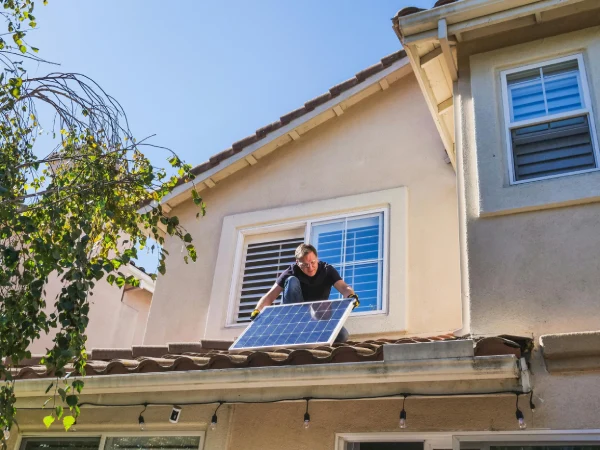
By Cenvar Solar
As one of the most popular renewable energy sources, solar energy provides homes with a low-cost, sustainable, and clean substitute for conventional energy sources. With advancements in solar technology and declining costs of solar panel installation, more homeowners are considering solar power as a viable option for meeting their energy needs. This article explores the advantages of solar energy for residential use, highlighting its environmental benefits, financial savings, energy independence, and overall contribution to sustainable living.
1. Environmental Benefits of Solar Energy
Compared to fossil fuels and other non-renewable energy sources, active solar energy has a limited environmental effect, which is one of its main benefits. Solar energy generation is a clean and sustainable energy source since it produces no pollutants, greenhouse gas emissions, or hazardous byproducts. Solar panels lessen dependency on fossil fuels and contribute to the mitigation of climate change by reducing carbon emissions and air pollution via the use of sunlight. Furthermore, the functioning of solar energy uses very little water, saving precious freshwater resources and lessening the impact on nearby ecosystems. Adopting active solar energy encourages environmental stewardship and helps create a more sustainable, healthy Earth for future generations.
2. Financial Savings and Return on Investment
Installing solar panels on your home can lead to significant financial savings over time by reducing or eliminating monthly electricity bills and providing a return on investment through energy cost savings. While the upfront costs of solar panel installation can seem daunting, homeowners can recoup their investment through lower electricity expenses and potential incentives such as tax credits, rebates, and net metering programs. With proper maintenance and regular monitoring, solar panels can continue to generate clean energy for 25 years or more, providing long-term financial benefits and protection against rising utility rates. Investing in solar energy not only saves homeowners money but also increases the value of their property and enhances its marketability in the future.
3. Energy Independence and Resilience
Solar energy offers homeowners greater energy independence and resilience by reducing reliance on the grid and providing a reliable source of electricity, especially during power outages or grid disruptions. With solar panels and battery storage systems, homeowners can generate, store, and use their clean energy on-site, reducing their dependence on centralized power systems and enhancing energy security. Solar-powered homes can remain operational and comfortable even when grid electricity is unavailable, providing peace of mind and resilience in the face of natural disasters or emergencies. By embracing solar energy, homeowners can take control of their energy future and reduce vulnerability to external factors such as fuel price fluctuations and supply disruptions.
4. Low Maintenance and Long-Term Durability
Solar panels are designed to be durable, low maintenance, and long-lasting, making them a reliable and hassle-free energy solution for homeowners. With no moving parts and solid-state construction, solar panels require minimal maintenance beyond occasional cleaning to ensure optimal performance and efficiency. The majority of respectable solar panel producers have guarantees that last between 20 and 25 years, ensuring homeowners’ peace of mind and dependable energy generation. Furthermore, improvements in solar technology have raised the durability, efficiency, and aesthetics of panels, increasing the appeal and affordability of solar energy systems for residential use. Homes may benefit from decades of clean, renewable energy with no maintenance and maximum dependability by making an investment in solar energy.
5. Positive Impact on Local Communities and Economy
The adoption of solar energy has far-reaching benefits beyond individual homeowners, contributing to the growth of local economies, job creation, and community resilience. Solar energy projects stimulate economic activity by creating jobs in manufacturing, installation, maintenance, and related industries, driving local investment and economic growth. Additionally, solar installations reduce strain on the grid and alleviate peak demand, lowering electricity costs for all consumers and enhancing grid reliability. Solar-powered homes also increase property values and attract environmentally conscious buyers, revitalizing neighborhoods and fostering sustainable development. By supporting solar energy initiatives, homeowners can contribute to the transition to a clean energy economy and create a brighter future for their communities.
Conclusion
In conclusion, harnessing solar energy for residential use offers numerous advantages, including environmental benefits, financial savings, energy independence, low maintenance, and positive impacts on local communities and economies. By investing in solar power, homeowners can reduce their carbon footprint, lower energy costs, increase resilience, and contribute to a more sustainable and resilient future. Embracing solar energy is not only a smart financial decision but also a powerful way to protect the environment, support local economies, and create a better world for future generations. With continued advancements in solar technology and increasing affordability, now is the ideal time for homeowners to make the switch to clean, renewable solar energy and reap the many benefits it has to offer.
